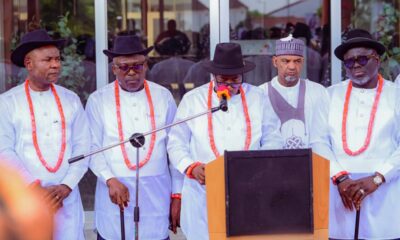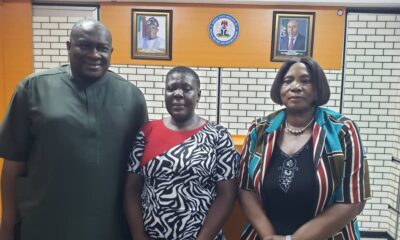News
Approach Zimbabwe For Solution, OBJ Tells FG
Former President Olusegun Obasanjo has advised that Nigeria should approach the government of Zimbabwe for a solution to the current all-time high inflation in the country.
He noted that since Zimbabwe was recently confronted with the same problem and came out of it, the southern African country would have useful advice for Nigeria.
In its latest release, the National Bureau of Statistics put Nigeria’s inflation at 29.9 per-cent.
The country is currently grappling with high cost of living, with pockets of protests breaking out across the country as Nigerians contend with increasing prices of foodstuffs.
Obasanjo, while speaking on Monday at a youth leadership symposium as part of activities lined up for his 87th birthday, said Nigeria had Zimbabwe to learn from.
The symposium with the theme “Opportunities for Peace: Roles of the Youths in Conflict Prevention in Africa” held at the Olusegun Obasanjo Presidential Library, Abeokuta.
It was put together by the Centre for Human Security and Dialogue in collaboration with the Institute for African Culture and International Understanding, Olusegun Obasanjo Presidential Library.
The ex-President said the times of challenges were not to give up but to face the problem head-on and draw lessons from those who encountered similar problems in the past and overcame.
He said, “When the time is rough and tough, the tough must get going..no problem is new and no problem will be permanent. Committing suicide is not the end of any problem, confront it and take it to God because he could do anything. When you have a problem look at those who have had this problem before and how they overcame it
“We have this problem of galloping inflation in the country now but do we have a country with such problems recently? Yes we do, Zimbabwe had this problem recently. Shouldn’t we ask them how they did it even if our approach will be different? Even if whatever we shall be doing will be different but we can ask questions to navigate our way out.”
Obasanjo also posited that dialogue, not guns or any form of violence, would help resolve the various conflicts on the African continent.
He said that like never before, conscious efforts to build and inculcate a culture of peace and security in the youth must be intensified to spur them to be at the vanguard of promoting peace rather than being used to perpetrate violence on the continent.
He said, “We must begin to bring up our youths in the culture of peace and security. The chances are where we have a culture of love, we will have peace. The first thing to do is to inculcate in the youths the ingredients of peace which is love and fellowship.
“Look at the attributes that God gave us to have a life of stability, life of peace, they are as I mentioned, kindness, mercy and forgiveness. All of these attributes are professed by God and He shared same with us to make life pleasant for us. But when we build negative attitudes, pull him down, then there will be a problem.”
He referenced biblical characters Esther, “who was able to secure her race from being exterminated,” and Joseph, “who helped to fight famine.”
“The youth must be at the vanguard of pursuing peace. They must be able to persuade those who believe that gun and violence is the way out of conflicts to have a rethink. The way out is conversation and dialogue.
“We have had our issues here during the civil war. We killed ourselves mercilessly and destroyed our best facilities but we still came back to the roundtable to get the challenge resolved.
“Youths must develop the culture of peace, the culture of humaneness, the culture of living the way God wants us to live,” Obasanjo added.
The coordinator of the programme and former Executive Secretary of the National Universities Commission, Prof. Peter Okebukola, said the essence of the symposium was to further drive home Obasanjo’s commitment to the African youths.
Okebukola, who is the Director of the Institute for African Culture and International Understanding, Olusegun Obasanjo Presidential Library, said, “This event is a testament to the belief that it is not enough to grant young people a seat at the table; their involvement must be vital and meaningful.
“Through targeted interventions, inclusive policies, and international collaboration, we aim to empower West African youths as catalysts for positive change, paving the way for a more peaceful and harmonious society.”
News
Fubara Attends PDPGF Meeting In Asaba …..Back Court Verdict On National Secretary Position

Rivers State Governor, Sir Siminalayi Fubara, last Friday, attended the Peoples Democratic Party Governors’ Forum (PDP-GF) meeting in Asaba, the Delta State capital.
The Rivers State Governor, who is the Vice Chairman of the PDP Governors’ Forum, attended the meeting, alongside 10 other Governors of the party’s controlled states across the six geopolitical zones of the country.
The first PDPGF meeting in 2025, was held at the Government House in Asaba, at the end of which a seven-point resolution was reached.
Reading the communique at the end of the meeting, the Chairman of the Forum, and Governor of Bauchi State, Senator Bala Mohammed urged the National Working Committee (NWC) to put every machinery in place to ensure a hitch-free NEC meeting on March 13, 2025.
The communique stated:
“The Forum, having examined all the notices required by law to be given to validly convoke NEC, advised NWC to reschedule NEC to the thirteenth (13Th) of March 2025.”
The Forum further noted the Court of Appeal judgment affirming Udeh Okoye as the National Secretary of the party, saying that as a party that believes in the rule of law, it will respect the position of the Appellate Court on the matter.
“The Forum noted with delight the ongoing efforts at resolving the crisis in the National Working Committee, NWC, on the position of the National Secretary, and has reaffirmed its support for the Court of Appeal judgment; consequently, the Forum advised the NWC to set up the machinery for the effective implementation of the court judgment.
“While commending the country’s valiant and patriotic Armed Forces and Security Agencies for maintaining the frontline in securing the country and the gains of our gallant personnel against bandits in parts of the country, the Forum viewed with deep concern, the resurgence of brazen non-state actors. It, therefore, calls for the strengthening of the nation’s security architecture.”
Governors in attendance include: H.E Senator Bala Abdulkadir Mohammed (Bauchi State); H.E Sir Siminalayi Fubara (Rivers State) – Vice Chairman; H.E Rt. Hon. Sheriff Oborevwori (Delta State) – Host; H.E Dr. Agbu Kefas (Taraba State); H.E Rt. Hon. Ahmadu Umaru Fintiri (Adamawa State); and H.E Dr. Dauda Lawal (Zamfara State).
Others are H.E Senator Ademola Adeleke (Osun State); H.E Senator Douye Diri (Bayelsa State); H.E Pastor Umo Eno Ph.D (Akwa Ibom State); H.E Dr. Peter Mbah (Enugu State); H.E Barr. Caleb Mutfwang (Plateau State);
and H.E Bayo Lawal (Deputy Governor, Oyo State), who represented Governor Seyi Makinde.
News
NGO Implants Free Pacemakers Into 22 Cardiac Patients In PH
A United States based Non Governmental Organisation, Cardiovascular Education Forum, in collaboration with the University of Port Harcourt Teaching Hospital (UPTH), has successfully implanted free pacemakers into 22 patients with different cardiac cases in Port Harcourt.
This is in a bid to save lives and encourage patients with low heartbeats to live longer.
The implantable device, which costs $20,000 each, was inserted free of charge on the selected patients.
Speaking during a Special Hospital Ground Rounds at the UPTH with its Theme, “Recent Advances in Cardiac Pacing,” a cardiac Physiologist, Dr Neil Grub, said the NGO was in Nigeria to improve training and learning on cardiac issues and help patients with cardiac problems.
Accompanied by a team of experts comprising a cardiologist and cardiac device implanter, Dr Jagdeep Siagh, and UPTH interventional cardiologist, Dr Edafe Emmanuel, Dr Grubb said pacemakers were inserted on patients with low heartbeats to boost their heart rates.
Earlier, the Chief Medical Director, UPTH, Prof Henry Arinze Ugboma, said each of the implantable devices cost over $20,000.
Ugboma, represented by the Chairman, Medical Advisory Committee, UPTH, Prof Datonye Alasia, said the partnership between UPTH and the foreign NGO was to build networks, and improve services in terms of healthcare delivery, training and learning.
According to him, there is now a ray of hope in terms of treatment of patients with cardiovascular cases in the hospital.
He said the UPTH started the collaboration with Cardiovascular Education Forum in 2018 to boost health, training and learning on cardiac health.
He assured that, “in coming years, the scale of our collaboration with the mission will be higher.”
Chinedu Wosu
News
FG Unveils National Broadband Alliance To Drive Internet Access
The Federal Government has unveiled the National Broadband Alliance, a new initiative aimed at transforming the nation’s digital infrastructure and boosting connectivity across the country.
The initiative was unveiled yesterday in Lagos by the Minister of Communications, Innovation, and Digital Economy, Bosun Tijani, who was represented by the Executive Vice Chairman of the Nigerian Communications Commission, Aminu Maida.
In his address, Tijani stated that NBAN would significantly enhance broadband penetration, which has grown from just six per cent in 2015 to approximately 42 per cent as of October 2024.
To support this agenda, he said the government was leveraging a Special Purpose Vehicle to deploy 90,000 km of fibre backbone across the nation, connecting underserved and rural communities to high-speed internet.
According to him, the initiative aligns with the Renewed Hope Agenda of President Bola Ahmed Tinubu, which prioritises innovation, technology, and collaboration as key drivers of national prosperity.
Tijani stated that the expansion would not only improve access to reliable broadband but also empower Nigerians, particularly in rural areas.
“While the progress made in broadband penetration is commendable, we recognise that much more needs to be done to ensure every Nigerian can enjoy the benefits of reliable, high-speed internet,” Tijani said.
The minister also emphasised the importance of strategic partnerships with donors, investors, and other key stakeholders in achieving the goals set out in the National Broadband Plan (2020–2025).
He said these collaborations would be essential in overcoming infrastructure development challenges and making broadband affordable and accessible for all Nigerians.
“These targets reflect our unwavering commitment to ensuring that broadband is accessible, affordable, and inclusive for all Nigerians. However, we are also aware of the challenges ahead,” he added.
Tijani stressed that achieving the government’s targets—70 per cent broadband penetration by 2025, a minimum internet speed of 25 Mbps in urban areas, and broadband access for 80 per cent of the population by 2027—will require sustained efforts.
“Achieving these goals will require more than just the efforts of the private sector. It will require a holistic approach that includes strategic partnerships with donors, investors, and other key stakeholders in accelerating the rollout of critical infrastructure,” he said.
-

 News9 hours ago
News9 hours agoNigeria Strengthens Economic Ties With Germany To Boost Investment, Jobs
-

 Featured6 hours ago
Featured6 hours agoFubara Flags Off Upgrading Of 135 Primary Healthcare Facilities In Rivers
-
Rivers7 hours ago
Bonny Protest Neglect, Seeks CSR MoU Implementation
-
Nation5 hours ago
FG Begins Tolling On Abuja-Keffi-Akwanga-Makurdi Highway
-
Business7 hours ago
NDYC Seeks NDDC Commercialisation … Uncompleted Projects Completion
-

 Rivers9 hours ago
Rivers9 hours agoCommissioner Promises Improved Working Conditions … Splashes N.1m On Outstanding Caregiver
-
Sports6 hours ago
Sports: 2nd Edition Of Inter-Tribal Tourney Kick-starts In Mbiama
-
Niger Delta7 hours ago
NACAT Inaugurates South-South Office In A’Ibom Against Corruption

